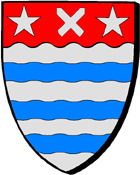
England
Bro Saoz


Essex
Bro-***
Encyclopédie Marikavel-Jean-Claude EVEN

England Bro Saoz |
 |

Essex Bro-*** |
Chelmsford
Caesarodunum
| page ouverte le 22.04.2004 | |
forum de discussion
* forum du site Marikavel : Academia Celtica |
dernière mise à jour
21/08/2009 10:40:06 |
![]()
| Définition : ville d'Angleterre; comté d'Essex. Ancienne fort romain : Caesarodunum. |
|
![]()
|
Extrait de la carte Ordnance Survey : Map of Roman Britain. |
![]()
Histoire : |
![]()
| Étymologie :
A. Caesarodunum : * Rivet & Smith (Place Names of Roman Britain) : - Itinéraire d'Antonin, 4743 (Iter V) : CAESAROMAGO - Itinéraire d'Antonin, 4806 (Iter IX) : CESAROMAGO - Ravenna, 10651 : CESAROMAGO - Table de Peuntinger : BAROMACI It was suggested by K. Miller (Itineraria Romana, 1916, note to p. xxvi) that TP's locative form resulted from the name coming at a join in the sheets of the map, the first part Ce- being on the sheet now lost and the first letter of the remainder being misread as B- when the surviving copy was made. This explanation has been generally accepted. The parallel suggested by R&C with Saragossa (Zaragoza) in Spain is not relevant (this was Caesaraugusta with distortions resulting from Arabic). In -maci we find the -c- which often appears by hypercorrection or miscopying. DERIVATION. The combination of Latin imperial name with Celtic element is unique in Britain. Presumably in each case there was artificial creation of a new settlement by administrative act, and a name of special dignity was hopefully assigned (for discussion of the present case, see C. E. Stevens in EHR, LII (1937), 198). On the Continent Augusto- Claudio-Julio- Flavio- are known as first elements in such names. Caesarodunum was the early name for what is now Tours (Indre-et-Loire, France), and Caesarobriga that of Talavera de la Reina (Toledo, Spain). The precise duplicate of the British name is Caesaromagus Bellovacorum in Gallia Belgica (Bellovacis > Beauvais, Oise, France). Magus is a common element in British and Gaulish toponymy. It seems to belong to the later stages of Celtic settlement, when permanent habitation was possible in settled conditions and in undefended lowland sites, this being implied in the sense of the word (see below). It represents a later stratum than briga and dunum, and it is significant that it is unknown in Iberia. Magus names are listed by Holder II. 384, the Gaulish names by Vincent 222-27, and Scottish examples by Watson CPNS 377-78. There are seven names known in Britain in ancient sources in addition to the present one : Leucomagus, Litanomagus, two Noviomagus, Sitomagus, uncom-pounded Magis and the ethnic Vacomagi. For a map of the European names, see H. Rix in Festschrift für Peter Goessler (Stuttgart, 1954), 106, and S. Piggott, Ancient Europe (Edinburgh, 1965), 174. The sense of original British *magos was 'field, plain', then 'market'. The latter sense is preferred for the present name by P. J. Drury in W. Rodwell & T. Rowley (eds.), The 'Small Towns' of Roman Britain (British Arch. Reports 15, Oxford, 1975, p. 163). The use of -magus in Celto-Latin toponymy was equivalent to that of Latin forum; indeed Juliomagus = Forum Julii. Derivatives include Welsh ma 'place' (now only in composition and then in the mutated form fa), Breton ma 'field'; and there is Irish mag(h), with moy 'plain' in place-names. See M. Richards in EC, XIII (1972), 366 ff. Although the compounds and formations like Noviomagus suggest long Latin familiarity with the word, it seems not to have passed (unlike briga, dunum) into Vulgar Latin as a common noun, and has left no Romance descendants. In compounds it was unstressed, the accent falling on the preceding vowel (-omagus). It does not appear as a first element, and is known in only one instance used alone, British Magis. IDENTIFICATION. The Roman town at Chelmsford, Essex (TL 7006). ----------------- Signification : La ville de marché de César ( = de l'empereur ! non de Jules César) ----------------- B. Chelmsford : * Eilert Ekwall : "Celmeresfort DB; Chelmeresford 1190 Fees. 'Ceolmaer's ford. The river-name Chelmer (Chelmer 1576 Saxton) is a back formation". * A.D Mills : "Celmeresford 1086 DB 'Ford of a man called Ceaolmaër'. OE name + ford. The river-name Chelmer is a 'back-formation' from the place-name". |
![]()
| Sources :
* Eilert Ekwall : The Concise Oxford Dictionary of English place-names. Clarendon Press. fourth edition, 1980. * Ordnance Survey : Map of Roman Britain. * ALF Rivet & Colin Smith : The Place-Names of Roman Britain. Batsford Ltd. London. 1979. * A.D MILLS : Oxford Dictionary of British Place Names. Oxford University Press. 1991. Ed. 2003. |
![]()
|
* forum du site Marikavel : Academia Celtica hast buan, ma mignonig go fast, my little friend |
![]()